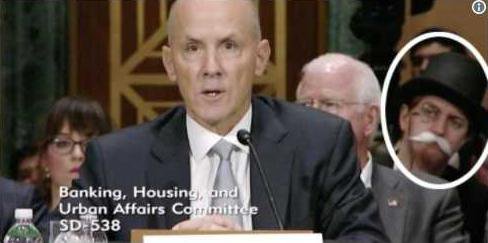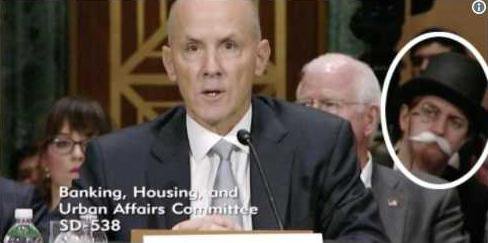The Monopoly guy has arrived in Washington.
A person dressed in a black top hat with a bushy white mustache and wearing a monocle appeared during the Senate Banking Committee hearing on the Equifax data breach Wednesday afternoon.
Many will notice the similarity between the man and Rich Uncle Pennybags, the main character from the board game Monopoly, according to CNBC.
As The Hill reported, many captured the person and posted pictures on social media.
The Monopoly man at the hearing was staged by a protest group, who wanted to draw attention to forced arbitration, which has been called a get-out-of-jail-free card for banks, according to one protest group.
Forced arbitration is the idea of a company forcing a consumer or employee to resolve any conflict in arbitration, waiving their right to sue.
Americans for Financial Reform, Public Citizen and their allies all delivered Monopoly inspired cheat cards to 100 Senate offices as a part of this protest, according to a press release.
The Monopoly protester, Amanda Werner of Americans for Financial Reform and Public Citizen, wore the outfit, handing out Get-out-of-jail-free cards at the hearing, too.
The Senate has hoped to push back against a rule from the Consumer Financial Protection Bureau to slow the use of arbitration clauses. The House voted to kill the rule.
"Arbitration is a rigged game," Werner said, according to CNBC. "Bank lobbyists and their allies in Congress are trying to overturn the CFPB's rule so they can continue to rip off consumers with impunity."
The hearing actually dealt with the credit rating agency Equifax that announced in September that data from more than 143 million had been stolen. Hackers lifted names, dates of births and Social Security numbers, among other pieces of personal credit information.
Terms and conditions to resolve claims against Equifax included an arbitration clause, which is meant to prevent people from suing the company, or joining together for a lawsuit, CNN Money reported.
Former Equifax CEO Richard Smith testified before the Senate Banking Committee on Wednesday, saying that a forced arbitration clause was not designed to be applied to the breach, according to CNN Money.
As CNN reported, Sen. Sherrod Brown (D-Ohio) didnt see how Smith could see the move as fair.
"I can't understand why you think for those 145 million in that case that forced arbitration is unfair, but in other uses in your company you think it's fair," he said.
A person dressed in a black top hat with a bushy white mustache and wearing a monocle appeared during the Senate Banking Committee hearing on the Equifax data breach Wednesday afternoon.
Many will notice the similarity between the man and Rich Uncle Pennybags, the main character from the board game Monopoly, according to CNBC.
As The Hill reported, many captured the person and posted pictures on social media.
The Monopoly man at the hearing was staged by a protest group, who wanted to draw attention to forced arbitration, which has been called a get-out-of-jail-free card for banks, according to one protest group.
Forced arbitration is the idea of a company forcing a consumer or employee to resolve any conflict in arbitration, waiving their right to sue.
Americans for Financial Reform, Public Citizen and their allies all delivered Monopoly inspired cheat cards to 100 Senate offices as a part of this protest, according to a press release.
The Monopoly protester, Amanda Werner of Americans for Financial Reform and Public Citizen, wore the outfit, handing out Get-out-of-jail-free cards at the hearing, too.
The Senate has hoped to push back against a rule from the Consumer Financial Protection Bureau to slow the use of arbitration clauses. The House voted to kill the rule.
"Arbitration is a rigged game," Werner said, according to CNBC. "Bank lobbyists and their allies in Congress are trying to overturn the CFPB's rule so they can continue to rip off consumers with impunity."
The hearing actually dealt with the credit rating agency Equifax that announced in September that data from more than 143 million had been stolen. Hackers lifted names, dates of births and Social Security numbers, among other pieces of personal credit information.
Terms and conditions to resolve claims against Equifax included an arbitration clause, which is meant to prevent people from suing the company, or joining together for a lawsuit, CNN Money reported.
Former Equifax CEO Richard Smith testified before the Senate Banking Committee on Wednesday, saying that a forced arbitration clause was not designed to be applied to the breach, according to CNN Money.
As CNN reported, Sen. Sherrod Brown (D-Ohio) didnt see how Smith could see the move as fair.
"I can't understand why you think for those 145 million in that case that forced arbitration is unfair, but in other uses in your company you think it's fair," he said.








